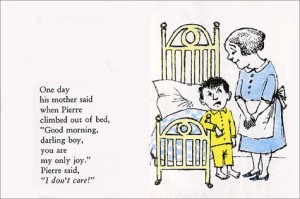I sometimes get a restless feeling.
A feeling that makes me want to take a trip, move to a new place, find a different job.
A feeling that tempts me to believe that my current place and work don’t really matter, that nothing I do is important, that continuing on with my life as it is seems utterly unappealing.
I’ve had this feeling off and on throughout most of my life, yet it was only recently that I discovered this feeling has a name:
Acedia.
Naming a thing has power.
Acedia.
It is the feeling that what you are doing does not matter, is utterly unimportant, and that you would rather be anywhere else doing anything else.
It is the feeling that causes us to feel bored and impatient with all of the “drudgery” of whatever role we have in our lives.
Doing the dishes after one more meal, sitting through one more meeting, driving the kids to one more practice, coming home to your spouse one more time,
these are all practices that can cause acedia in our hearts.
We live in a consumer culture, one that advises us to keep our options open so that we are free to seize the new and improved edition when it comes out.
It prompts us to see obligations to family, friends, and colleagues as impediments to that freedom … Whatever the place of our commitment — a monastic cell, a faith community, a job, a marriage — well, we are better off just walking away … But soon we discover that no place will satisfy us, and no one person, no group of friends, can meet our needs. The oppressive boredom we had hoped to escape is lodged firmly within us … ~ Kathleen Norris in Acedia and Me
Acedia is a condition of the heart that has long been recognized by the Christian spiritual tradition as a temptation to be resisted.
It shows itself in a boredom with the mundane, repetitive tasks of life, in not caring about anything in our hectic schedules, in a listlessness and a desire to give up and move on to something else, anything else.
What is it like, this failure in the art of life? It is the failure which manifests itself in a loss of interest in really important things … But if … your feelings and sensibilities are withering, if your relationships with people near to you are becoming more and more superficial, if you are losing touch even with yourself, it is Acedia which has claimed you for its own.” ~ Robertson Davies in The Deadliest of the Sins
The problem is, of course, that acedia is a disorder of the heart rather than a disordering of any outward circumstances. That restless, listless feeling can and does come with any work, any community, any place.
Let me pause and say that acedia is different from depression or despair. I like the way Kathleen Norris puts it: “For despair, participation in the divine nature through grace is perceived as appealing, but impossible; for acedia, the prospect is possible, but unappealing.”
Un-pause.
What, then, is the solution? If a change will not dislodge acedia from our hearts, what will?
Again we turn to our heritage, our earlier Fathers and Mothers of our faith, for help.
Their counsel lies in the spiritual practices of prayer and endurance.
Evagrius Ponticus, a fourth century monk and theologian, urged, “Endurance cures listlessness, and so does everything done with much care and fear of God … Set a measure for yourself in everything that you do, and don’t turn from it until you’ve reached that goal.” But also, “pray intelligently and with fervor, so that the spirit of listlessness will flee.”
Several of the desert Mothers and Fathers instructed their students to perform the humblest of tasks with full attention and no fussing over the whys and wherefores.
It seems too simple, to merely carry on with your current task in your current place with your current people.
Yet I can attest to the wisdom of their counsel from my own experience. The times I have responded to acedia with change, the feeling continues to hound me. The times I have responded with endurance, the temptation eventually flees.
Perseverance is the essential condition for conquering the temptation of acedia.
The monks and mystics of my faith all teach that persevering in a spiritual discipline, especially when it seems futile, is the key to growth. ~ Kathleen Norris
The consequence of not enduring? A gradual withering of desires and passion and interest in anything at all, as well as an enslavement to your own self.
There is no longer any room for an abandonment … to the other or for the joy of gift; what remains is sadness or bitterness within the one who distances himself from the community and who, being separated from others, finds himself likewise separated from God. ~ Jean-Charles Nault, OSB in Acedia: Enemy of Spiritual Joy
In my own life, I have found a great power in being able to name this feeling that comes upon me now and then. It gives me courage to hold on, knowing that if I will only continue to pray and endure, this temptation, like all others, will eventually flee.
I pray that this gives you courage as well.
I end with a prayer from the Book of Common Prayer. Take these words and use them when you have trouble finding your own. Peace be on you.
This is another day, O Lord. I know not what it will bring forth, but make me ready, Lord, for whatever it may be. If I am to stand up, help me to stand bravely. If I am to sit still, help me to sit quietly. If I am to lie low, help me to do it patiently. And if I am to do nothing, let me do it gallantly. Make these words more than words, and give me the Spirit of Jesus. Amen.
To hear my blog post read aloud, just click the play button. If you’re reading this in an email, you may have to click here to hear the post on my site.
Art credits: book images are from Pierre: A Cautionary Tale in Five Chapters and a Prologue by Maurice Sendak




